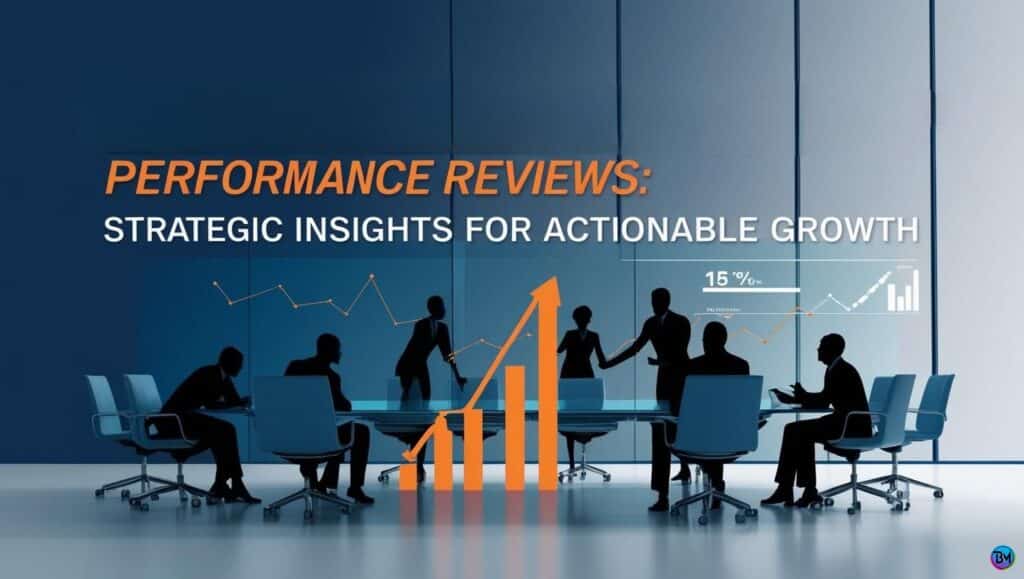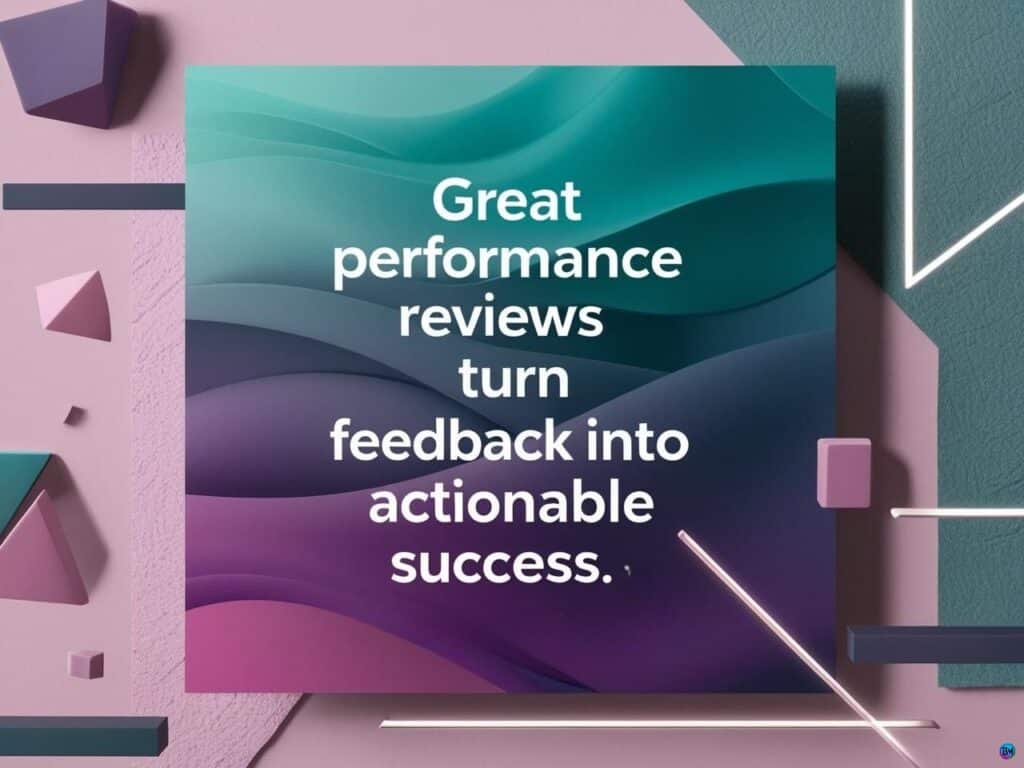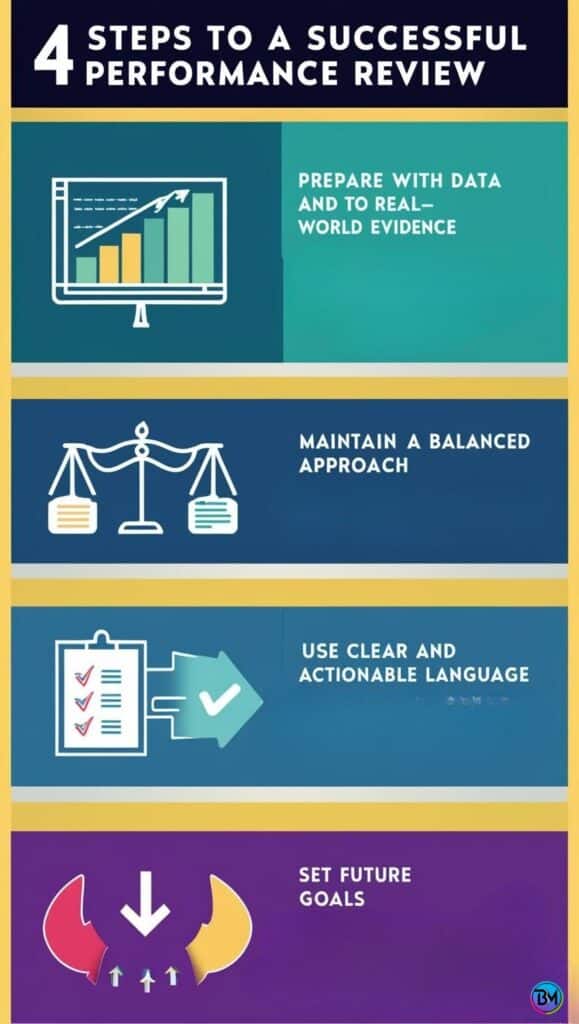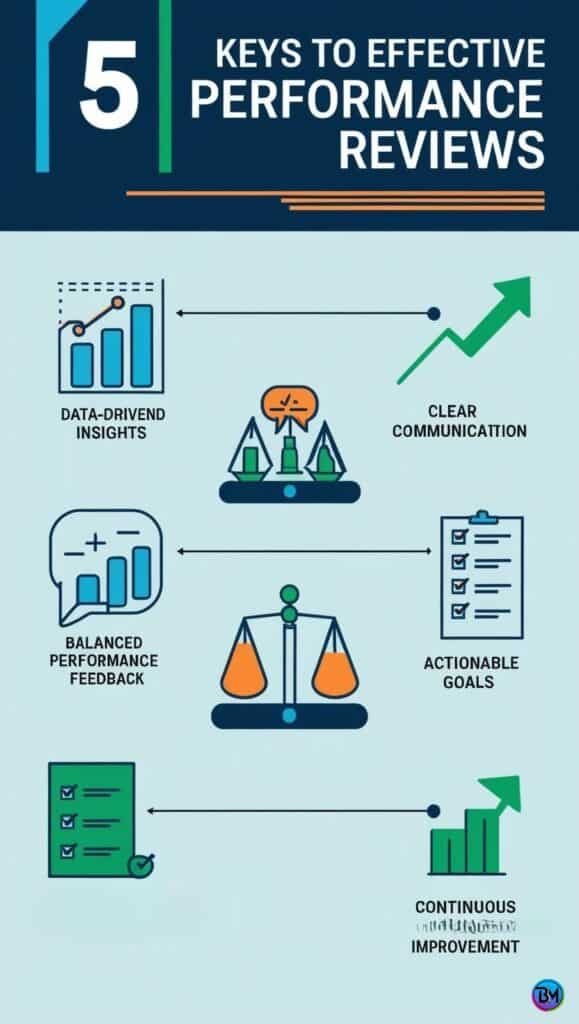In today’s competitive business landscape, every leader is constantly challenged to refine their team management strategies and optimize performance. Whether you’re an HR professional, an executive, or a manager seeking to improve your leadership skills, effective performance reviews are key to fostering growth and accountability. In this guide, we’ll explore a wealth of manager performance review examples and share best practices for delivering reviews that are both constructive and commercially effective.

Understanding the Importance of Performance Reviews
Performance reviews are more than just a formality; they’re a strategic tool for recognizing achievements, identifying areas for growth, and aligning team efforts with the organization’s vision. When managers conduct structured and evidence-based reviews, they create a culture of accountability and continuous improvement.
Key Benefits:
- Increased Engagement: Regular feedback helps employees feel valued and understood.
- Clear Expectations: Performance reviews clarify goals and expectations, reducing ambiguity.
- Professional Growth: Constructive reviews provide actionable insights for personal and professional development.
- Improved Productivity: By highlighting strengths and weaknesses, reviews can pinpoint areas where further training or support may be needed.
Why Effective Manager Performance Review Examples Matter
Using targeted examples can transform a routine review into an engaging and actionable conversation. Manager performance review examples serve multiple functions by offering concrete evidence of performance, celebrating successes, and identifying opportunities for growth. Here’s why they’re essential:
- Benchmarking Success: Real-world examples help set performance benchmarks that are specific, measurable, and realistic.
- Enhanced Clarity: Examples remove ambiguity, allowing both the reviewer and the reviewee to clearly see what works and what needs improvement.
- Commercial Impact: In a competitive commercial landscape, demonstrating a culture of high performance can be a strong selling point for attracting top talent.

Top Manager Performance Review Examples
1. The Collaborative Leader
Scenario:
A manager consistently encourages team collaboration and has fostered an environment where every team member feels heard.
Key Performance Areas:
- Team Communication: Actively facilitates regular team meetings and encourages open dialogue.
- Conflict Resolution: Quickly identifies and resolves conflicts before they escalate.
- Employee Development: Invests time in mentoring and supporting career progression.
Review Example:
“Your ability to unite the team around common goals has significantly improved our project turnaround times. Moving forward, consider implementing peer-to-peer recognition initiatives to further enhance collaboration.”
2. The Strategic Innovator
Scenario:
A manager who implements creative strategies to meet aggressive targets.
Key Performance Areas:
- Innovation and Creativity: Continuously seeks out new tools and methods to optimize processes.
- Risk Management: Balances innovation with calculated risk-taking.
- Results Achievement: Consistently exceeds performance targets.
Review Example:
“Your innovative approach in spearheading new initiatives has directly contributed to our quarter-over-quarter growth. To build on this success, experiment with a pilot program to test emerging strategies in a controlled environment.”
3. The Data-Driven Manager
Scenario:
A manager who utilizes data to drive decisions and refine team performance.
Key Performance Areas:
- Analytical Decision-Making: Uses key metrics to assess team performance and drive improvements.
- Transparency: Shares data insights with the team to inform decision-making.
- Continuous Improvement: Identifies trends and adjusts strategies for better outcomes.
Review Example:
“Your commitment to a data-driven approach is clearly reflected in our improved performance metrics. As a next step, consider developing a dashboard to visually track team progress and enhance transparency.”
Performance Review Examples for Managers: Tips and Best Practices
Crafting effective performance reviews requires careful preparation and a structured approach. Here are some actionable tips and practices to consider when using performance review examples for managers:
1. Prepare with Data and Real-World Evidence
- Gather Relevant Data: Review past performance reports, customer feedback, and team metrics. Tools like Statista can offer industry benchmarks.
- Document Specific Examples: Ensure that every point you make is supported by specific examples from recent projects or collaborations.
2. Maintain a Balanced Approach
- Celebrate Achievements: Start by recognizing what the manager has done well.
- Identify Areas for Improvement: Follow up by constructively discussing areas where change is needed.
3. Use Clear and Actionable Language
- Be Direct: Clearly outline what behaviors to replicate and what changes are needed.
- Offer Support: Provide suggestions and resources that can help the manager improve.
4. Set Future Goals
- Action Plans: Conclude with a clear roadmap for future improvement.
- Continuous Follow-Up: Schedule periodic check-ins to monitor progress.

Management Performance Review Examples: Strategies for Effective Assessment
When it comes to management performance review examples, it’s essential to tailor your approach to reflect both leadership and strategic planning capabilities. Here are two detailed examples:
Example 1: Leadership and Accountability
Scenario:
A manager who takes full ownership of team performance, demonstrating leadership in times of change.
Review Focus:
- Ownership: Acknowledge the accountability taken in both successful and challenging projects.
- Adaptability: Emphasize the ability to pivot strategies during market shifts.
- Team Empowerment: Note instances where the manager has empowered team members to take initiative.
Review Example:
“Your decisive leadership in our recent reorganization was commendable. By taking ownership of team challenges and fostering an environment of empowerment, you have set a new benchmark for accountability. We encourage you to further develop these initiatives by hosting leadership workshops to share your insights with emerging leaders within the department.”
Example 2: Strategic Vision and Execution
Scenario:
A manager who aligns team objectives with broader company goals through effective strategy implementation.
Review Focus:
- Strategic Planning: Evaluate how well the manager anticipates market trends and prepares the team.
- Execution: Assess the effectiveness of turning plans into tangible results.
- Financial Acumen: Consider the impact on revenue and cost-efficiency.
Review Example:
“Your strategic foresight has played a pivotal role in our recent market expansion. By aligning team objectives with our broader corporate goals, you’ve not only driven impressive revenue growth but also improved operational efficiency. Looking ahead, we recommend leveraging predictive analytics tools to further refine your strategy and maintain this momentum.”
Read more about: Becoming A Strategic Leader
Project Manager Performance Review Examples: Aligning Goals and Outcomes
For project managers, performance reviews must consider factors unique to project management, such as deadline adherence, resource allocation, and stakeholder communication. Here are practical project manager performance review examples that highlight these aspects:
Example 1: Execution Excellence
Scenario:
A project manager who consistently delivers projects on time and within budget.
Review Focus:
- Deadline Management: Showcase examples of meeting or exceeding deadlines.
- Budget Adherence: Highlight the ability to manage costs effectively.
- Stakeholder Communication: Emphasize proactive communication with clients and team members.
Review Example:
“Your commitment to executing projects within tight deadlines while strictly managing budgets is impressive. Your clear and timely communication with all stakeholders significantly contributes to project success. For continuous improvement, consider implementing a risk assessment matrix early in the project phase to identify potential delays before they occur.”
Example 2: Innovation in Project Delivery
Scenario:
A project manager known for innovative approaches that enhance project outcomes.
Review Focus:
- Process Improvement: Recognize innovation in streamlining project workflows.
- Quality Assurance: Detail efforts made to maintain or enhance quality under tight constraints.
- Team Collaboration: Highlight how effective collaboration has improved project delivery.
Review Example:
“Your innovative approach in project management has not only improved workflow efficiencies but has also enhanced the overall quality of our deliverables. The collaborative culture you foster within the project team is a significant asset. Moving forward, consider incorporating agile methodologies to further improve response times and adapt to changing project needs.”
Read more about: Agile Project management

Performance Review Summary Examples for Managers: Crafting a Clear Recap
A clear, concise performance review summary is essential for reinforcing feedback and setting a foundation for future improvements. Here are a few performance review summary examples for managers:
Example 1: Balanced Summary for Ongoing Development
Summary Example:
“Over the past review period, you have demonstrated significant leadership and accountability. Your innovative strategies and commitment to team development have driven several key successes. However, there is an opportunity to improve in proactive risk management and further enhance cross-departmental collaboration. Our goal for the next period is to leverage your strategic expertise while addressing these growth areas through targeted training and mentorship programs.”
Example 2: Concise Summary with Actionable Goals
Summary Example:
“Your performance this period has been marked by consistent achievements, particularly in meeting project deadlines and enhancing team communication. As we move forward, focus on developing robust contingency plans and refining your data-driven decision-making process. Let’s work together on a personalized action plan that leverages these strengths and addresses the areas where improvements can be made.”
Best Practices and Key Metrics
Beyond using stellar manager performance review examples, it’s crucial to follow best practices and utilize key performance metrics to create reviews that are both efficient and effective. Here are some guidelines:
1. Align with Business Goals
- Commercial Impact: Ensure that performance metrics align with broader business objectives. For example, if increasing revenue is a goal, evaluate the manager’s contribution through project success rates and cost savings.
- Integration with Strategy: Incorporate strategic targets into each review to create a clear link between daily performance and the company’s long-term vision.
2. Use Data-Driven Insights
- Quantitative Metrics: Leverage quantitative data such as project completion rates, budget adherence, employee satisfaction scores, and performance improvement percentages. According to recent studies from Statista, organizations that implement data-driven performance reviews see up to a 20% increase in employee engagement.
- Qualitative Feedback: In addition to numbers, qualitative feedback from peers and subordinates provides context and depth to the review.
3. Continuous Improvement
- Iterative Process: Performance reviews should be part of an iterative process that involves regular check-ins and adjustments.
- Employee Empowerment: Provide managers with the tools and autonomy to implement their own improvement plans based on review outcomes.
4. Foster Open Communication
- Two-Way Dialogue: Encourage a culture of open feedback where the review process is seen as a collaborative conversation rather than a one-sided evaluation.
- Personal Development Plans: Use the review as a foundation to build personalized development plans that are aligned with the manager’s career goals and the company’s strategic needs.
Frequently Asked Questions (FAQs)
Q1: What are the key components of an effective manager performance review?
A: An effective manager performance review should include:
- Clear performance metrics and goals
- Specific examples of successes and challenges
- Constructive feedback and actionable recommendations
- A summary that aligns individual performance with business objectives
- A clear roadmap for future development
Q2: How can I tailor performance review examples for managers to different roles?
A: Consider the unique responsibilities of each role. For example, project manager performance review examples should focus on project delivery, stakeholder communication, and risk management, whereas reviews for senior managers might emphasize strategic vision, leadership, and financial results. Customizing reviews to reflect role-specific responsibilities ensures that feedback is relevant and actionable.
Q3: How frequently should performance reviews be conducted?
A: Best practices suggest conducting performance reviews on a quarterly or bi-annual basis, with informal check-ins in between. This approach allows for timely adjustments and ongoing dialogue, keeping performance goals aligned with shifting business needs.
Q4: Can performance review examples be adapted for remote teams?
A: Absolutely! For remote managers, highlight aspects such as digital communication, virtual team building, and the use of technology to track team performance. Remote performance reviews should also acknowledge the unique challenges of remote work and offer solutions that foster collaboration and accountability.
Q5: What resources can help me further improve my performance review process?
A: Numerous high-authority resources offer valuable insights. Consider exploring articles from Forbes and Harvard Business Review. In addition, our internal content on leadership development and productivity tips at bestofmotivation.com can provide actionable strategies for enhancing your performance review process.
Conclusion
In today’s dynamic business environment, effective performance reviews are critical for driving managerial success and fostering a culture of continuous improvement. By leveraging robust manager performance review examples, such as those shared in this guide, organizations can create structured, data-driven evaluations that not only highlight accomplishments but also pave the way for future growth.
Whether you’re refining your approach with performance review examples for managers, exploring comprehensive management performance review examples, seeking specific project manager performance review examples, or crafting clear performance review summary examples for managers, the key is to use a balanced, actionable strategy that resonates with both your managers and your organizational goals.
Embrace these best practices today:
- Celebrate successes
- Identify growth opportunities
- Set clear, attainable goals
- Use concrete data to guide decisions
Start transforming your performance reviews into powerful growth catalysts that drive commercial success!
Ready to revolutionize your performance review process? Subscribe to our newsletter for more actionable insights and practical guides, and check out our in-depth articles on leadership and management at bestofmotivation.com.

By following the actionable tips and leveraging these examples, you’ll be well on your way to creating performance reviews that not only evaluate past success but also set the stage for future achievements. These tools and strategies will help you build a more engaged, productive, and commercially successful management team.
This comprehensive guide is designed to be a one-stop resource for business leaders, HR professionals, and managers alike, ensuring that every performance review discussion becomes a stepping stone towards greater achievements. With clear examples, actionable tips, and data-driven insights, you now have the foundation to conduct performance reviews that truly matter.
Remember, effective reviews are a dialogue—not a monologue—so keep the conversation open, continuous, and focused on collective growth. Happy reviewing!
External Sources:
- Statista for industry insights and data.
- Forbes for expert leadership tips.
- Harvard Business Review for management best practices.
Related Articles:
- Explores essential mindset transformations for effective leadership
- Focuses on building ethical leadership principles
- Covers emerging management trends and essential skills
- Discusses leadership strategies in the era of artificial intelligence












